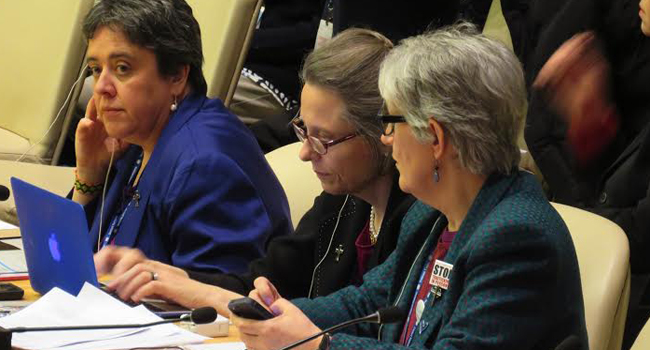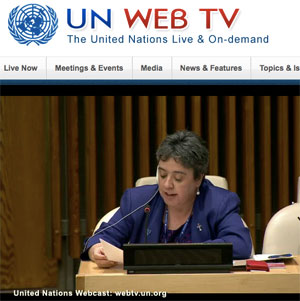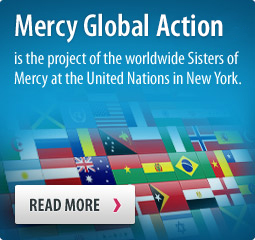
Sisters of Mercy Call for a Radical Shift in Understanding and Addressing Human Trafficking
Reports: February 16, 2016
Last week, at a United Nations Special High Level Event on trafficking, Angela Reed rsm delivered a strong and clear message to Member States and policy makers. Calling for real solutions to the problem of trafficking, she claimed that we must shift from understanding human trafficking as a 'random act of victimisation' to 'systemic oppression over the life course leading to vulnerability to exploitation'.

L-r: Angela Reed rsm (Resident, Mercy Global Action), Aine O'Connor rsm (Mercy Global Action Coordinator at the UN), Winifred Doherty RGS (NGO Representative at the UN of the Congregation of Our Lady of Charity of the Good Shepherd). Photographer J. McDermott. Used with permission
The intervention [video at 3:02:32 -3:05:07] , delivered with great conviction on behalf of the Sisters of Mercy and the Congregation of Our Lady of Charity of the Good Shepherd, challenged policy makers to understand trafficking from a life course perspective [1]. Challenging the dominant discourse on trafficking which is largely focused on criminality and migration, Angela called for a focus on prevention, whereby children’s rights to safe housing, adequate schooling, and health and wellbeing are realised across the life course.
 Informed by trafficking survivors, Sr Angela is convinced we must take note of the insights and recommendations from formerly trafficked women in order to respond with viable and real solutions.
Informed by trafficking survivors, Sr Angela is convinced we must take note of the insights and recommendations from formerly trafficked women in order to respond with viable and real solutions.
A poignant moment in the Special High Level Trafficking meeting at the UN was when former trafficking victim, Ms Rani Hong shared her story of struggle and resilience and ultimate survival. She and her husband have recently founded the Tronie Foundation, an anti-trafficking non-government organisation ‘working to include the trafficking survivor voice in finding solutions'. Reinforcing the power of the human story, Ms Hong claimed, 'We are more than our stories, we are part of the solution'. This reinforced the notion that in order for real solutions to be addressed, we must privilege the insights gained from narratives shared by those who have been trafficked and offer recognition, response and decent redress.
Participating in this high level meeting forms part of the advocacy priority adopted by Mercy Global Action at the UN. Giving Voice to Formerly trafficked women is a key advocacy point that the Sisters of Mercy will be promoting at the Commission on the Status of Women which will be held in March 2016 at the United Nations in New York. The Sisters of Mercy have submitted a written statement to this commission which can also be accessed on the commission’s website.

In addition to oral and written interventions, Sisters of Mercy will co-host a parallel event at the Commission on the Status of Women with Good Shepherd International and Australian Catholic Religious Against Trafficking in Humans (ACRATH). The event will take place on 17 March, 2016 and is entitled ‘No Random Act: Human Trafficking and the Interplay between Systemic Oppression and the Individual Life Course'. The event will highlight the stories of formerly trafficked women and the value that can be gained from listening to these stories. It will highlight the significance of cumulative marginalisation and stigmatisation over the life course and will promote a five point advocacy strategy. The panel will consist of Angela Reed rsm, and two colleagues from Cebu, Philippines, Mrs Marietta Latonio and Ms Mely Lenario.
The Five Point Framework outlined below is considered a best practice approach and enables women to exercise real power and control over their lives as rights-holders. Specifically it calls for policy that:
1. privileges the insights gained from narratives shared by those who have been trafficked;
2. recognizes that the interplay between the personal life story and systemic oppression renders one vulnerable to human trafficking;
3. acknowledges cumulative disadvantage and addresses vulnerabilities across the life course;
4. prioritizes and uses qualitative data on actual experiences and circumstances of trafficking for policy formulation;
5. addresses the systemic causes of economic social, gender disparity and discrimination.
This approach calls for radical structural change including:(1) dismantling power based systems that subjugate women and girls; (2) ensuring that all boys and girls receive quality primary and secondary education; (3) addressing inequitable monetary, trade, investment and financial policies; and (4) the implementation of a decent living wage and the realising of a universal social protection floor.
Messages to:
Angela Reed rsm - Resident, Mercy Global Action
Aine O’Connor rsm - Mercy Global Action Coordinator at the UN
[1] A Life Course perspective is a multidisciplinary approach to looking at a person's story alongside the world that person lives in, including the social, historical, economic and political environments. 'Being born in a certain place at a certain time and having certain experiences lead one to be vulnerable to being trafficked.' See 'I Have a Voice - Trafficked women in their own words' by Angela Reed rsm and Marietta Latonio, pps 85-87 for an explanation of that perspective in relation to sex trafficking




